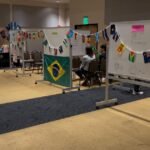Sunday, Nov. 24, 2024 | 2 a.m.
Nevada Assemblywoman Cecelia González has an observation about the lawmaking process: If there weren’t legislators of color in the room, certain issues would go undiscussed.
That’s why, as the newly elected chair of the Nevada Latino Legislative Caucus, González is eager to make sure the issues affecting her community are considered, discussed and addressed in the 2025 Legislature, which convenes in February.
“It’s really powerful for our community to know that the everyday person can get elected to office,” said González, a Las Vegas Democrat. “And can do it and can represent their government and their community, while also their lived experience.”
González is like many in the central Las Vegas district she represents — a native who is the daughter of immigrants. The third-term assemblywoman says she will continue to bring her experience from her Mexican and Thai upbringing to the Statehouse.
González said she plans to continue community outreach and programming, and meet with the other Latino caucus members at the group retreat planned next month to outline priorities moving forward. In the 2023 session, there were eight members in the caucus and González says she wants to continue their work, focusing on housing, rising living costs and access to affordable health care.
Assemblywoman Selena Torres, D-Las Vegas, will serve as the caucus’s vice chair and state Sen. Fabian Doñate, D-Las Vegas, will serve as secretary/treasurer. Doñate chaired the caucus in the 2023 Legislature.
González is also a teacher at Mater Academy East, a UNLV doctoral candidate, wife and new mother.
“I work at a majority-Latino school on the east side of Las Vegas, and so seeing the needs of our students is hopefully what I seek to address in the Legislature,” González said. “Like making sure that every student has access to a high-quality education regardless of where they live.”
Her advocacy for residents’ educational rights — regardless of their background — extends into how she views health care.
She is hopeful lawmakers will reconsider a proposal to extend Medicaid coverage to undocumented residents in Nevada. The HOPE Act, or Senate Bill 419, approved in the 2023 Legislature, would have provided Medicaid coverage for undocumented residents but it was vetoed by Republican Gov. Joe Lombardo and sustained when lawmakers failed to generate the required two-thirds’ majority vote in the state Senate and Assembly to override.
“The HOPE Act was for undocumented folks to receive Medicaid. And then it got negotiated to (include) children and pregnant mothers. This was regardless of citizenship status,” González said. “Right now, they are ineligible to receive any state benefits, including Medicaid.”
Lombardo vetoed 75 bills in the 2023 legislative session. Should he veto any legislation in the upcoming session, the Democratic majority again will have to depend on some Republican lawmakers to join them to gain the required votes to override the governor. That’s because earlier this month, Democrats again fell short of securing a veto-proof supermajority in both legislative chambers. As a result of the election, Democrats lost the slim supermajority they held in the Assembly and failed to gain the one needed seat to establish a supermajority in the state Senate.
Even without the supermajority that would challenge Lombardo’s vetoing powers, González expressed optimism in bringing back the bills struck down from the previous session.
“I would want to see all of our bills that were vetoed come back, even ones that I don’t agree with, because they still made it through the process of getting to the governor’s desk,” González said.
Democratic Assemblywoman-elect Cinthia Moore is another member of the Latino caucus. Her district includes parts of Las Vegas and North Las Vegas, and she said she saw how her neighbors were often the first to feel economic plight during tough periods for the country.
“The No. 1 issue that I heard about while knocking on doors was the economy,” Moore said. “So that is one of the things that I’m interested in that’s important to me, finding ways that we can reduce costs for Nevada families.”
Moore echoed González’s calls for state legislators to represent their communities through lived experience.
“I am the very first Mexican-born woman elected to the Legislature,” Moore said. “It’s important that when we are electing folks to the state Legislature, that they reflect the communities they come from.”
Deportation plans are worrisome
With Donald Trump taking office as president Jan. 20, González was asked what she would suggest to prepare immigrants in Nevada who might be threatened by the president-elect’s policies.
Trump has said he planned to use the military in a massive deportation effort targeting 11 million undocumented residents nationwide. In Nevada, there are 136,000 U.S. citizens who live with at least one undocumented family member, according to a 2020 report from the American Immigration Council.
As a state lawmaker, González has little voice in national politics, but she said sharing accurate information in residents’ native languages would be paramount.
“We really don’t know what this is going to look like, and so I think that folks should definitely have their documents in order, in case anything were to happen,” González said. “Have a backup plan, a safety plan, almost. But also, we’re all kind of just navigating this together in real time.”
She said she empathized with immigrants in Nevada fearful of what might happen.
“I think that it is completely normal to be scared about the future of our country with another Trump administration,” González said. “And so, I think that fear is natural, but we also can’t let that attack us as well.”
Many opponents of Trump’s deportation plans have expressed concerns on how they could affect the labor sector, like agriculture, hospitality and construction workers. González finds this line of argument counterproductive.
“Folks are like, ‘Oh, well, if we supposedly do this mass deportation, we’re going to see such a hit to our economy,’” González said. “Well, these people just aren’t our labor, right? These people aren’t just the job that they do. They’re people, they have families, they have humanity.”
[email protected] / 702-990-8923 / @haajrahgilani










